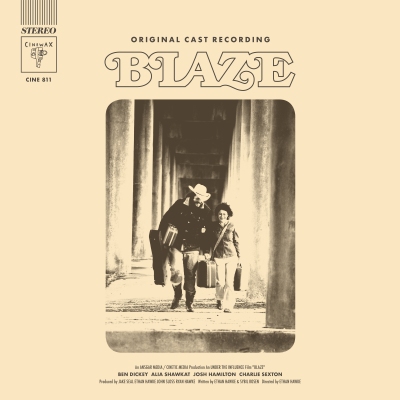Blaze Foley There Goes That Hand Again
BLAZE Soundtrack Paints Moving Tribute to Fallen Legend
 Diverse Artists
Diverse Artists
BLAZE: Original Bandage Recording
(Calorie-free in the Attic Records)
Release date: ix/21/18
Listening to the soundtrack of a film one has still to see is a test for the ears. Gratuitous of images to pair with the music, the mind digests the sounds heard in equally-is fashion. While such an experience tin be but equally fulfilling as playing a record linked to a well-watched favorite motion-picture show, the flip-side is alike to looking at an incomplete picture. The bones are in that location, but the rest of the canvas is waiting to be fleshed out.
For the soundtrack to the new biographical film "Blaze" directed past Ethan Hawke, the higher up description is pretty apt. Centered around the tumultuous life of deceased country singer and songwriter Bonfire Foley, "Blaze" sounds like a movie that attempts to pigment a motion-picture show of a character who defies like shooting fish in a barrel clarification. The soundtrack to the film, featuring performances by the musician and actor portraying Foley, Ben Dickey, amongst others, is a fitting companion slice. What the project lacks in abyss, information technology makes up for with musical highlights.
Foremost among these highlights are Dickey sung covers of some of Foley'south best-known songs "Clay Pigeons" and "Film Cards." The erstwhile is a seemingly hopeful melody played on acoustic guitar in Foley's signature loping finger-picking style. Over added sound effects that mimic chirping birds, Dickey sings of starting over again and going "down where people say y'all." However, the song'due south bright melody belies additional lines near hiding sorrow and changing the shape the vocaliser is in. Information technology's an optimistic number shrouded in sadness, and given the tragic consequence of Foley's short life the sentiment is liable to cut straight to a listener's eye with repeated listens.
Perhaps even more aching in nature, "Picture Cards" is a honey song sung from the edge of despair. Again featuring Dickey on vocals and finger-picked acoustic guitar, the track is absolute past lonesome harmonica that trails over lyrics that talk of finding daylight in a lover's eyes, simply also of not trying to fall in love and trying instead to launder those feelings away. Nevertheless more heartbreaking is the addition of the sound of pool beingness played in the background of the song's latter one-half, as if Dickey is performing the number in a lonely bar with apathetic patrons focused more than on their billiard game than on the singer in the corner.
If the impression given then far is that the Blaze soundtrack consists of cypher but melancholy state tunes, then let the tape likewise show that in that location are moments of levity too. Snippets of chatter like Dickey'due south introductory "Okey-dokey smokey" that opens the anthology, or what appears to be director Hawke cheering at the determination of the song "Big Cheeseburgers and Proficient French Fries" give an added air of informality to the recording of the soundtrack as a whole, and promote jovial feelings of what the temper may accept been like on set. This ascertainment goes double for the off –the-cuff sounding duet betwixt Dickey and co-star Alia Shawkat on the cover of Roger Miller's "Oo-De-Lally" best known from its appearance in Disney'due south animated feature "Robin Hood."
It is also worthwhile to note the album is not simply a showcase for Dickey's talents, though he shoulders the majority of the workload, even writing his own tribute to Foley and the singer's former partner Sybil Rosen, entitled "Blaze and Sybil's Lullaby." Musician Charlie Sexton, who appears in the film portraying another ill-blighted singer and songwriter, Townes Van Zandt, gets in on the action too, contributing a cover of the Van Zandt song "Marie." And Alynda Segarra of the band Hurray for Riff Raff, who plays Blaze's Foley's sister Marsha in the motion-picture show, is tasked with bringing the soundtrack to a close with her sparse rendition of the Lucinda Williams' penned tribute to Foley "Drunken Angel."
The lyrics to Williams' song provide a telling summation of Foley's life and untimely decease. "Sun came up it was another day / And the sun went down you were blown abroad," the words go. "Why'd you let go of your guitar / Why'd you ever allow it go that far."
Those are good questions. Blaze Foley lived a life full of contradictions, so many in fact that even a film garnering as much early praise as "Bonfire" probably has its hands full trying to accurately portray every angle of a man, who spent his time running away from tidy identification. The pieces of his story are there, like breadcrumbs ultimately crafting a phantom trail to some firm resolution, merely legends are always more than than the sum of their parts.
With Bonfire: Original Cast Recording both Foley and Ben Dickey accept been cast as stars. Listeners who rails down the album and see the moving picture volition gain a fuller picture of both men, but if the soundtrack is all one gets to experience just the songs will practice. The best of the bunch rise to a higher place the level of simple stars. Their timelessness, like Foley's own saga, volition live on forever.
Read more by Michael Cimaomo at www.michaelcimaomo.wordpress.com.
Source: https://michaelcimaomo.wordpress.com/tag/blaze-foley/
Post a Comment for "Blaze Foley There Goes That Hand Again"